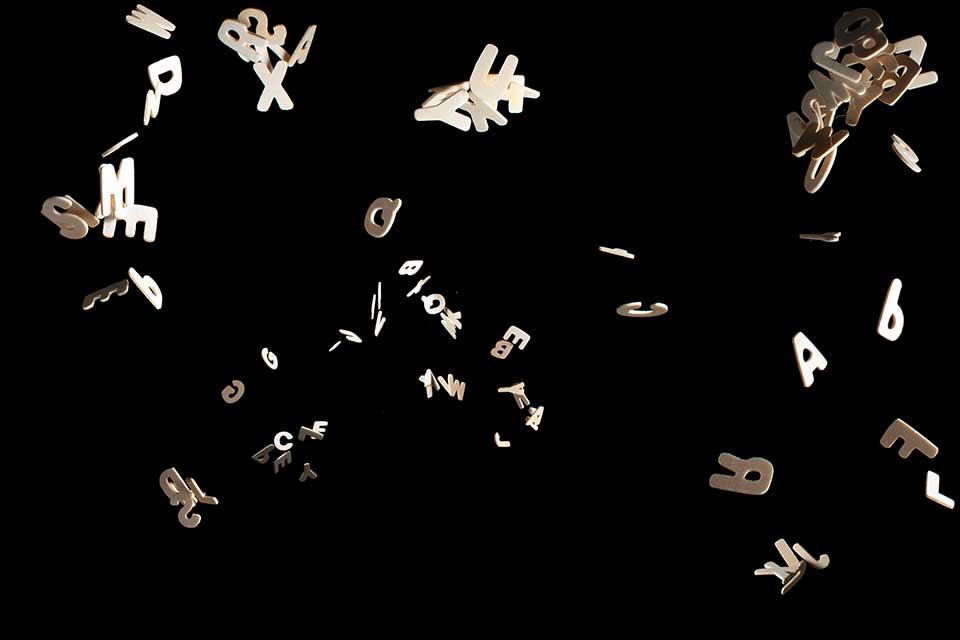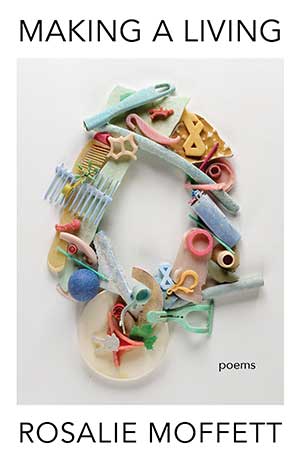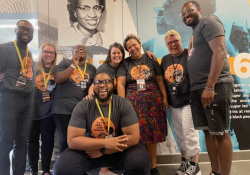Motherhood, Writing, and Making a Living: A Conversation with Rosalie Moffett

The excess of capitalism is the backdrop in Rosalie Moffett’s Making a Living (Milkweed, 2025), and at the foreground: motherhood, debt, forest fires, and a speaker who is deep down like everyone “obsessed with dreaming / up the future, with hell, with all / that spares us.” Throughout Moffett’s third poetry collection, the sacred and the mundane collide as the speaker negotiates pregnancy and early motherhood amidst the economies and desires that shape a Midwestern domestic life. Forsythia blooms outside the DoubleTree Inn. On the screen of the Doppler weather app, desire “rises, scatters.” Moffett’s poems hold space for omens and prophecies, taxes, prenatal vitamins, and longing that unfolds like a “pocketknife.” Moffett, a former Wallace Stegner Fellow from Stanford University and assistant professor at the University of Southern Indiana, is deeply interested in the ways poetry can uniquely think about time and the systems that shape contemporary life. We discussed her poetic consideration of search results, 401Ks, and the complex emotions of passing on this troubled world to a new generation. In Living, hope is never a far cry from violence, and evocations of beauty keep company with banality. “What then will I become? Above the / new Costco, skeins of geese strung across the sky. On the / display of discount flat-screens, more sky.”
 Kathryn Savage: In what ways does Making a Living keep company with your earlier works of poetry, Nervous System and June in Eden?
Kathryn Savage: In what ways does Making a Living keep company with your earlier works of poetry, Nervous System and June in Eden?
Rosalie Moffett: In each of these books, what I’ve ended up doing, sometimes from wildly different angles, is try to discern how we come to think we know a thing and to plot the limits of what can be known. So, I end up looking at the forces of authority at work: science and history and faith, and also the way language itself operates on our thinking.
In Nervous System, I was drawn into a poetic reckoning with my mother’s symptoms of aphasia, weaving in neurological research and myth and etymology. In that book, as well as June in Eden, I was thinking closely about the intrinsic relationship that a poem’s line—breaking off, as it does, into a blank space—has to the unknown, how it revels in making the mind aware of these blank spaces, and aware of the need to cross them, back into what is knowable.
And in Making a Living, that blank space is the future, a domain that was extended for me by the desire to have a child. This is an expanse that is commodified, is preyed on and profited from, is probed by medical procedures whose goal is to diagnose its potential holes. This future is ratcheted into the present by predictive-text, by search results based on past buying behavior, and padded by 401Ks and mortgages. Pieces of the future are being bought and sold, piecemealed into stock-market ticker symbols. So, in the book, I’m looking at that: how to think about the future, given our present, how to think of it, given a child.
Savage: Throughout Making a Living, a McDonald’s or Costco appears in poems with titles like “A Prophecy” and “Omen.” I was interested in this adjacency; what is the balance you seek to strike in your work between the sacred and the mundane or profane?
Moffett: I’d like to position each, in my poetry, to set the other in some kind of relief. And, to give a sense of what kind of impulses are at work in me, I thought, typing this: relief? The word suddenly strange and multivalent in my mind. And the etymology lets me know it comes from the French, relever, to re-lift—i.e., the sense I meant: to lift up the sacred, to let it be discerned from the profane, and vice versa—but the entry also states that the word was used earlier in English as “that which is left over or left behind” and also as “feudal payment to an overlord made by an heir upon taking possession of an estate.”
There are histories haunting what we say, which means they haunt how we think.
So, like so many words we use, blithely, there are histories haunting what we say, which means they haunt how we think. Surprisingly often, these ghosts reveal the overlap between money and the metaphysical, the profane and the sacred. This factors in several times in Making a Living, as I consider, for instance, mortgage, which comes from death pledge, redeem from bribe, blessing from wound. So, perhaps, one goal in the book—which I approach with a certain inventory of image, with metaphor and juxtaposition—is to become aware of these overlaps, to see through the murk to tell what is prayer, what is commerce.
Savage: I noticed “hope” is the title of three poems. How does Making a Living hold space for hope?
Moffett: I think the book holds space for hope the way the stack of firewood in “Omen” holds space for the invasive ash beetle: it can’t keep it out, and what it does might be called beautiful and might be called damage.
And, like the beetle, an understanding of the nature of hope bores in through the cracks between poems. “A Prophecy Is Nothing” ends with “the multitude self-populates / with algorithmic precision what it thinks / you’ll want. What may work best as bait.” The next title is “Hope.” The future baits us, like deer to a salt lick, with hope. It is so beautiful and glittering, it is so necessary to our survival as we enter the clearing—
And here I am, here we are, blinking in the sunlight. Who would step into the future without it, given all the evidence in the present?
Savage: In the poem “Forsythia,” the speaker weaves together the past, present, and future. “There’s the present where everyone lives, now / studded with moments I’ve robbed from a time / I imagine, in which a child watches me scavenge / the landscape for bits of beauty, / learns how to do it herself.” I’d love to hear you discuss the transitory, in relationship to nurture.
Moffett: Recently, late to the party, I got John Berger’s About Looking, and happened to crack it open to a page on which I read, “Memory implies a certain act of redemption. What is remembered has been saved from nothingness.” Strangely, I think I can say that memory and hope share a lot of qualities. They are both inaccurate, untrustworthy, damaging, and beautiful—and they save us from nothingness.
I often argue that poetry can think about time in a way nothing else can, partly through what I call the tesseract of the line, which can transport us through great distances, which can trick us, almost, into the kind of large-scale perspective that we as a species seem to struggle with (see: climate change.) This catapult of time and scale is something I’m conscious of, and courting, especially in the poem “Hysterosalpingography” where the “wiggle room” of ancient prophecy becomes the exam room for our present-day medical auguries, where the fundus of the eye or uterus is made to expand wildly, becomes the sky.
Sometimes, as I work on a poem, I think of each time I press the “return” key as an experiment I conduct on myself: will my mind make the leap? Will it cross this distance? How much not-knowing can I handle, and when will what I’m asking it to assemble—what the world can hold—be too much? My experience of having my daughter has posed these same questions.
How much not-knowing can I handle?
Savage: Throughout Making a Living, I noticed several titles repeat, and keen attention is also paid to prophecy. How does repetition relate to the unknown and anticipated?
Moffett: Yes, I love the connection between titling—and repetition of titles—and prophecy. It comes, in part, from a suspicion of certainty. You turn to the table of contents as a navigational tool for what’s ahead. A prophecy or omen, same. But repetition troubles that logistic: hope? which hope? which redemption? What seems to be an offering of navigability, of predictability, is undone as you move through the book. Even the trick I love, of a title bleeding into the first line, has a destabilizing feeling: you thought you were at the door? You’re already inside. What seemed the beginning reveals itself as the middle. In the poem “Time and Place,” each sonnet end devolves, you might say, back to being a middle.
So, because I am not prophetic, what I offer is what it does to me, what it does to us: the relentless desire to reach into the future, our relentless failures to do anything more but keep marching into it, second by second.
Savage: I loved how the poem “A Prophecy Is Nothing” suggests that fulfillment and loneliness are twined. “It’s so easy these days / to receive what you thought / you needed while in night’s emporium / of urgencies.”
Moffett: Oh, I think buying things exacerbates loneliness. And when the algorithm is doing its thing: feeding us products and services, the way a good friend listens, watches, knows just what to get us for our birthday, isn’t there a sense, momentarily, that we aren’t alone?
But then, of course, there’s an epidemic of loneliness, and Amazon is richer than many countries. Furthermore, Amazon hosts Ring as its subsidiary, which operates something called Neighbors, which is a “hyperlocal social networking app” that allows users to “anonymously discuss crime” and provide footage to law enforcement. So, even the people closest to each other can be made faceless and suspicious, for a fee.
Savage: Poems such as “Total Liability” measure costs. Insurance, mortgages, and indebtedness appear throughout the book. How do the demands of capital inform your poetics?
Moffett: The demands of capital shape almost everything—they shape my time, my attention, my energy, so they have a bearing on my poems, which are made from my time, my attention, my energy.
As you might guess from my answer re: loneliness, it seems clearer to me every day that our capitalist (violent, ruthless) culture is self-alienating, is a barrier to tenderness, to happiness. A wonderful poet offered me this advice on an early, more bitter draft of Making a Living: It needs more emotional intimacy. This comment revealed to me how the alienation of consumerism had suffused my writing about consumerism, and the effort required to allow sensitivity and vulnerability to come back into the poems. Because ultimately that urge—a bitter, angry cataloging of American absurdities, a kind of poetic gripping of the reader’s shirtfront and yelling Look!—is linked to sensitivity and vulnerability.
I always tell my students that one of the beauties of poetry is the way it allows us to turn back to our lives with heightened awareness, with new eyes. For me, the arc of the book is toward this awareness: the ability to inhabit this place—America, English, capitalism—without numbing ourselves to it with our screens and consumerism, without looking away.
One of the beauties of poetry is the way it allows us to turn back to our lives with heightened awareness, with new eyes.
Savage: On vulnerability, pregnancy is mapped onto the page. I wonder if the book traces gestational age? If you consider it to be chronological?
Moffett: I wanted to resist the chronological arc—but I couldn’t. I wanted to keep the arrival of my daughter out of the book, but couldn’t. And bringing her in made it easier to move the poems toward tenderness, to loosen my grip on the shirt of the reader. Narrative is interested, of course, in consequence—consequence requires time. And, despite my lyric sensibilities, I suppose I can’t escape that.
Savage: In the introduction to Art Monsters: Unruly Bodies in Feminist Art, Lauren Elkin observes: “As I began writing this book, I became pregnant with my son, and my interest in a feminist art of the body became specifically concerned with how the body speaks. . . . There was something new and low in my body, rumbling and trembling and twitching, with a new relationship to gravity.” Tenderness, gravity. Would you like to say more on how motherhood informs your poetics?
Moffett: The formal sensibility and moral sensibility of my work in progress is very influenced by motherhood. I’m at work on a series titled “To Hear a War from Far Away” (which draws its title from Etel Adnan’s “To Be in a Time of War”), and in the series form, I’m trying to capture the profusion of moments that make up motherhood, while allowing the rawness of it, the privilege and gentleness of it, to be struck by a consciousness of atrocity, of the ongoing genocide in Gaza. Once, while driving to teach, I felt my milk let down when I heard the cries of a starving baby on NPR’s coverage of the famine in Gaza.
I’ve been aware, as I work on this, of how my effort to understand “how we come to think we know a thing” becomes a different kind of work now. What distances is the mind unable to cross, to close? What mechanisms (of fear, of sensitivity, of rhetoric, of identity) limit my capacity to grasp the magnitude of this atrocity? What kind of poem can I write as an American mother at this time?

Rosalie Moffett is the author of Making a Living (2025); Nervous System (2019), which was chosen by Monica Youn for the National Poetry Series Prize and listed by the New York Times as a New and Notable book; and June in Eden (2017). She has been awarded a Wallace Stegner Fellowship from Stanford University, and her work has appeared in American Poetry Review, New England Review, Narrative, Kenyon Review, and Ploughshares, among others. She is an assistant professor at the University of Southern Indiana, and the senior poetry editor for the Southern Indiana Review.















